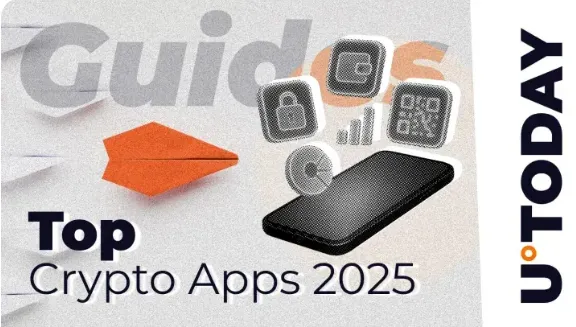
Disclaimer: The opinions expressed by our writers are their own and do not represent the views of U.Today. The financial and market information provided on U.Today is intended for informational purposes only. U.Today is not liable for any financial losses incurred while trading cryptocurrencies. Conduct your own research by contacting financial experts before making any investment decisions. We believe that all content is accurate as of the date of publication, but certain offers mentioned may no longer be available.
- Top cryptocurrency apps in 2025: Highlights
- Top crypto apps in 2025: List
- Top crypto apps 2025: Overview
- What are crypto apps?
- Crypto app categories: Top 5
- Cryptocurrency wallets
- Crypto exchanges
- Decentralized finance protocols (DeFis)
- Crypto price trackers
- NFT marketplaces
- Choosing secure crypto apps: Basic tips
- Wrapping up: How to find your best crypto apps for daily use
In 2025, there are hundreds of thousands cryptocurrency applications available on the market. In this guide, we are going to observe the most dominant types, share some basic security tips and overview some interesting platforms that can be helpful for newcomers.
While no glossary can be complete enough to provide the reader with the whole picture of cryptocurrency protocols in 2025, this guide by U.Today can make your crypto journey safer and more profitable.
Top cryptocurrency apps in 2025: Highlights
Cryptocurrency application is a software protocol that utilizes cryptocurrencies (digital currencies) in a variety of ways.
- Cryptocurrency application (crypto application, crypto app) is a class of software that uses blockchain technology in its daily operations.
- Cryptocurrency applications facilitate various operations with cryptocurrency, including sending, receiving, trading, storing and earning of cryptocurrency as well as crypto price tracking, spending crypto and so on.
- Some cryptocurrency applications are fully on-chain while others include centralized storage of funds and private keys.
- Crypto wallets, crypto exchanges, DeFi protocols, crypto price trackers and NFT marketplaces are among the most popular categories of cryptocurrency applications.
Choosing the basic stack of cryptocurrency applications for regular daily activity requires security, functionality, cost-efficiency considerations.
Top crypto apps in 2025: List
In 2025, the following applications might be called among the most popular basic cryptocurrency services for beginners:
- CoinStats
- Uniswap
- The Crypto App
- Trezor
- MetaMask
- CoinMarketCap
- Binance
In the guide, we'll explore their opportunities, characteristics, tech designs, and so on.
Top crypto apps 2025: Overview
In this section, we are going to overview the textbook examples of cryptocurrency applications from the biggest categories.
CoinStats
Website: https://coinstats.app?from=article-links/?from=article-links?from=article-links
-
Launched in:Q2, 2023
-
Main business:Premium crypto portfolio management and price data app
-
Blockchains:1,000+
-
Registration:USA
CoinStats is an all-in-one cryptocurrency portfolio manager application. It is designed to help crypto owners manage their liquidity across multiple decentralized and centralized exchanges, track key trends in the crypto segment and get the latest market analytics in a seamless way.
Narek Gevorgyan
Native Swap
Crypto price tracker, API tooling, Swap module, customized feed.
No
CoinStats is one of the most popular newbie-friendly portfolio managers in the world. It is trusted by over 1 million crypto traders in all regions and territories across the globe.
Launched in late 2020, CoinStats, a premium cryptocurrency tracking application for Bitcoin (BTC) and all mainstream altcoins, is a popular portfolio management instrument. Through a powerful combination of AI-driven tools, it provides cryptocurrency traders and investors with all necessary analytics for profitable trading, liquidity providing and so on.
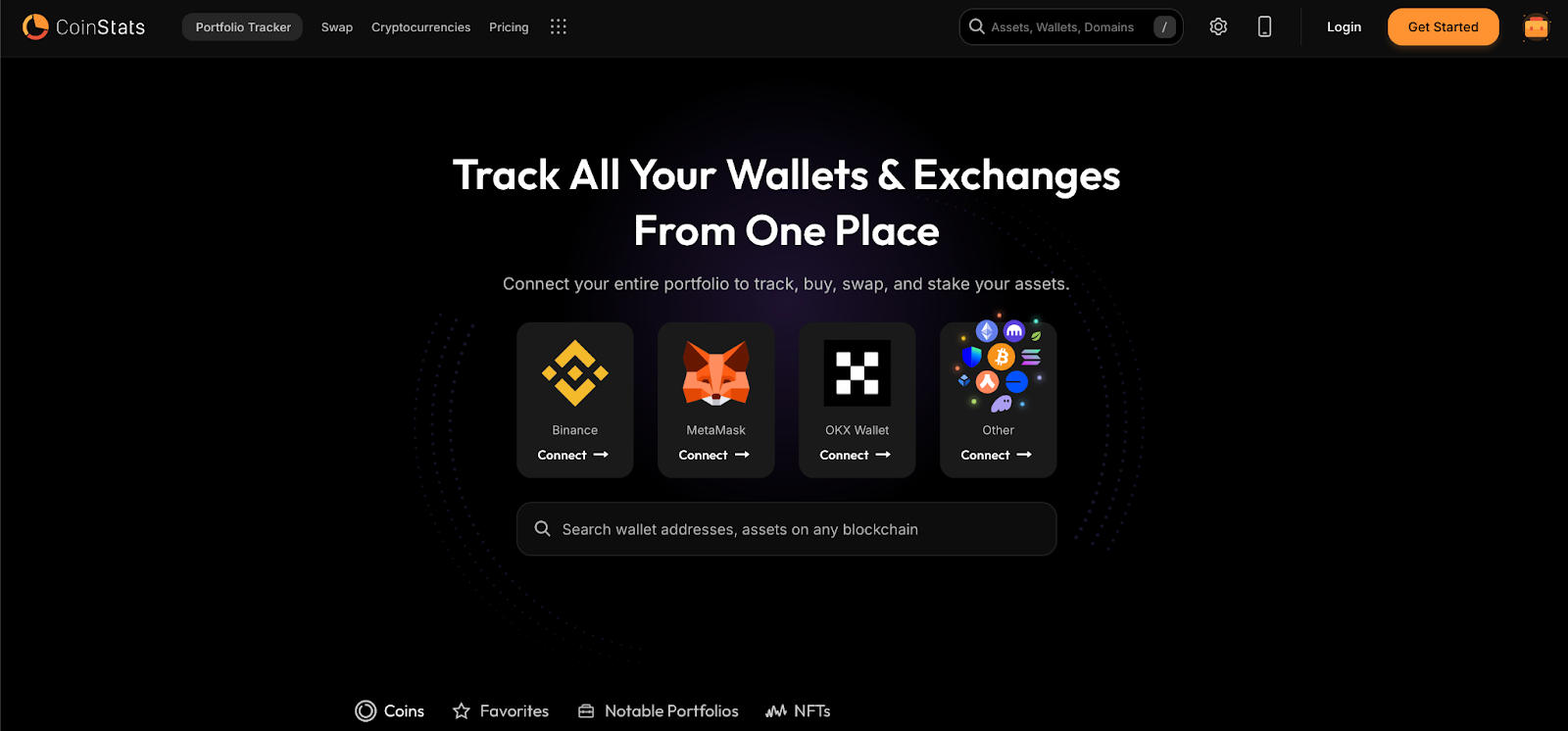
Unlike previous-gen analogs, CoinStats helps customers to track their portfolios across various exchanges simultaneously — both centralized and decentralized. In total, it observes 20,000+ cryptocurrency assets, 1,000+ protocols and 10+ EVM and non-EVM chains. Its built-in blockchain explorers (analogs of browsers in crypto) are designed for straightforward tracking of crypto transactions, blocks, validators, accounts and so on.
CoinStats’ native swap module allows customers to exchange crypto from non-custodial wallets in a couple of clicks. The portfolio tracker is designed to showcase the portfolios of the largest companies that have Bitcoin (BTC) and Ethereum (ETH) treasuries. Also, the NFTs module can be helpful while researching blue-chip drops of digital collectibles.
Uniswap
Website: https://app.uniswap.org/?from=article-links?from=article-links?from=article-links
-
Launched in:Q4, 2018
-
Main business:Open-source decentralized crypto exchange protocols
-
Blockchains:Ethereum, Unichain, Arbitrum, Optimism, Polygon, Base, Blast, Avalanche C-Chain, BNB Smart Chain, Celo, Soneium, World Chain, ZKsync, Zora
-
Registration:USA
Uniswap is an open-source cryptocurrency exchange protocol for non-custodial crypto wallets. It allows users to exchange various Ethereum-like cryptocurrencies with no intermediaries while Uniswap only acts as an interface for conversion.
Hayden Adams
Native DEX
Crypto wallet, own L2 blockchain, VC unit
Unichain
For a very long time, Uniswap was the largest non-custodial exchange in crypto. The idea of Uniswap was shared with Hayden Adams by Ethereum (ETH) founder Vitalik Buterin.
Launched in November 2018 by Hayden Adams, Uniswap is an open-source decentralized cryptocurrency exchange protocol (interface). Uniswap pioneered the very concept of automated market maker (AMM), a crucial instrument for a decentralized economy.
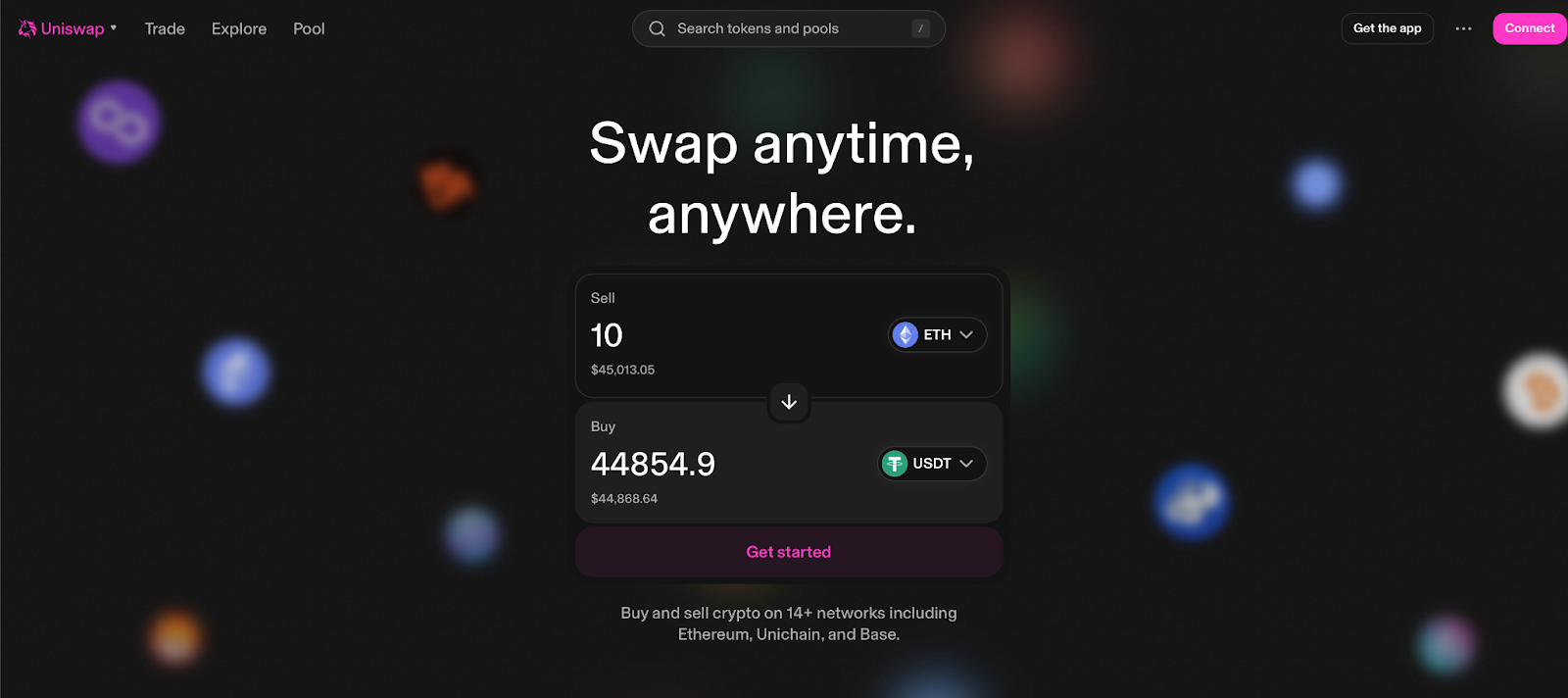
It facilitates secure and cost-effective cryptocurrency exchange between various Ethereum Virtual Machine (EVM) networks, i.e., blockchains that work similar to Ethereum (ETH).
As of July 2025, Uniswap supports the industry-biggest number of L1 and L2 blockchains, including Ethereum, Unichain, Arbitrum, Optimism, Polygon, Base, Blast, Avalanche C-Chain, BNB Smart Chain, Celo, Soneium, World Chain, ZKsync and Zora.
With Uniswap’s V2, V3 and V4 every owner of a decentralized (non-custodial) wallet like MetaMask (see below) can exchange their cryptocurrency. Also, users can provide liquidity to Uniswap exchange pools and enjoy periodical payouts of liquidity provider rewards (LP rewards).
For its operations, Uniswap charges transaction fees. Also, Uniswap made headlines by launching its own L2 blockchain Unichain.
The Crypto App
Website: https://thecrypto.app?from=article-links/?from=article-links?from=article-links
-
Launched in:Q2, 2023
-
Main business:All-in-one cryptocurrency data tracker with price charts, portfolio management and a news feed
-
Blockchains:100+
-
Registration:Canada
The Crypto App is a one-stop application for all things crypto. The Crypto App offers price tracking, managing crypto funds via APIs, a customized news feed, an alerting system and much more.
No
Price tracker, portfolio management tooling
No
The Crypto App secured over 84,000 reviews across dozens of platforms with an average score of 4.5/5.
The Crypto App is a one-stop cryptocurrency data application for all things crypto, including coin tracking, analysis and blockchain market news. Launched in 2023, The Crypto App is available for both iOS- and Android-based smartphones. The Crypto App secured 84,000 reviews with a 4.5/5 average score across multiple platforms.
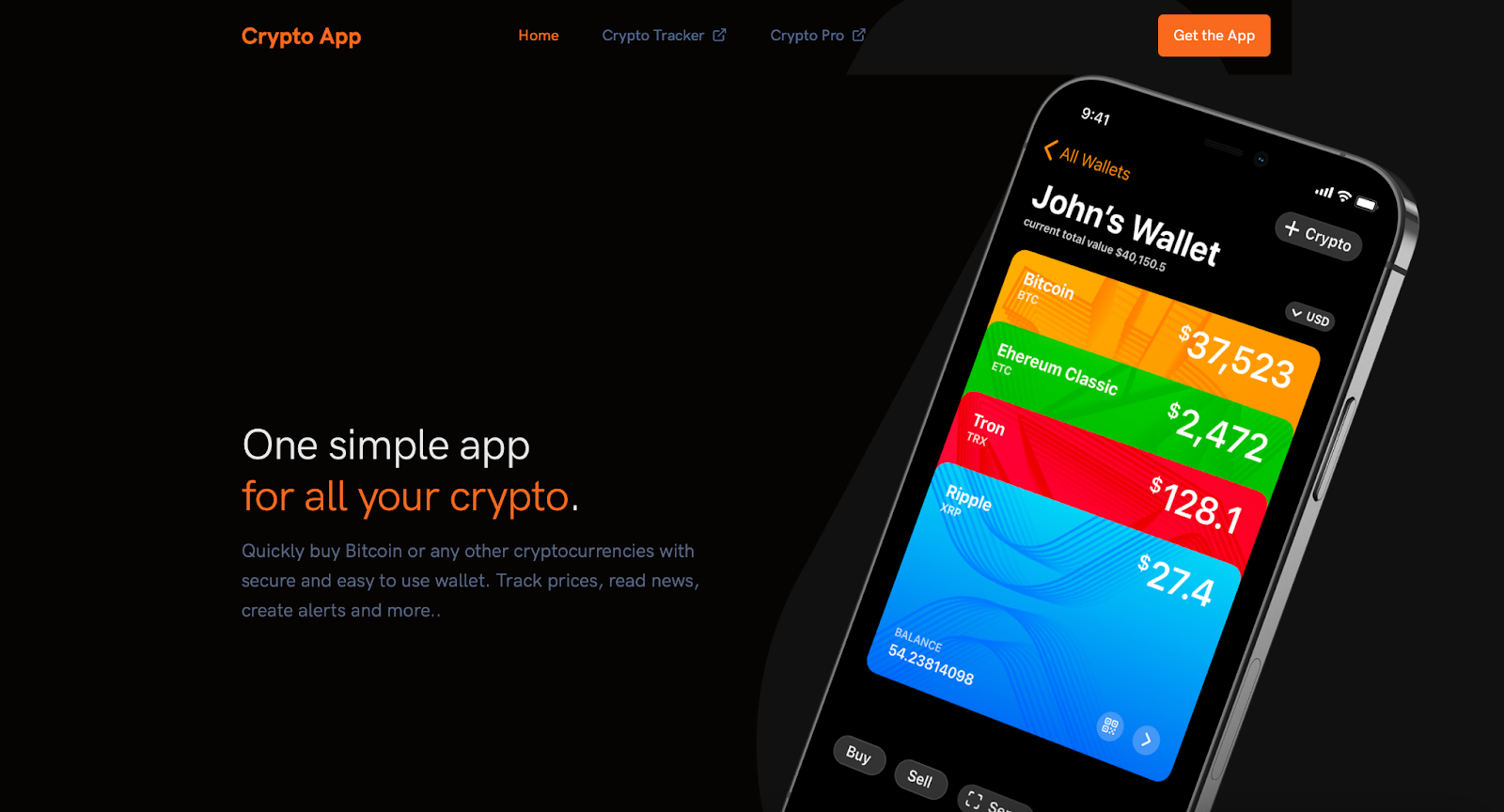
Equipped with The Crypto App unique tooling, cryptocurrency owners can keep track of their portfolios seamlessly and monitor over 10,000 coins and tokens across 100+ exchanges — both centralized and decentralized. Coin performance overview and advanced charting is designed to help traders, investors and liquidity providers to make their decisions data-driven and balanced.
The Portfolio Manager toolkit helps crypto owners to trade on the go across multiple exchanges using a secure API connection, while the personalized newsfeed showcases only the most interesting topics for this or that user. The alerting system helps The Crypto App users never miss a thing.
Trezor
Website: https://trezor.io/?from=article-links?from=article-links?from=article-links
-
Launched in:Q3, 2014
-
Main business:Crypto hardware wallet
-
Blockchains:1,000+ coins and tokens
-
Registration:Czech Republic
Trezor Wallet is a secure, cryptographically protected hardware wallet for Bitcoin (BTC) and 1,000+ altcoins. Trezor stores private keys completely offline for maximum safety, acting as a digital vault. Trezor operates through native app Trezor Suite or leading third-party self-custody apps.
Marek Palatinus, Pavol Rusnak
Native DEX
Crypto hardware wallet, application, swap and staking module, backup devices.
No
Trezor Model One was the first crypto hardware wallet in general. Trezor offers live demo sessions with experts to ease the onboarding of new customers. Also, it is among the rare crypto hardware wallet to offer staking and swapping of crypto.
Launched in July 2014, Trezor is a popular and reliable hardware cryptocurrency wallet for Bitcoin (BTC) and 1,000+ altcoins. It ensures secure and confident storage of private keys from on-chain cryptocurrency accounts. Its application allows users to transact cryptocurrency assets in a seamless way. For maximum security, Trezor handles all transactions offline, protecting assets from internet exposure.
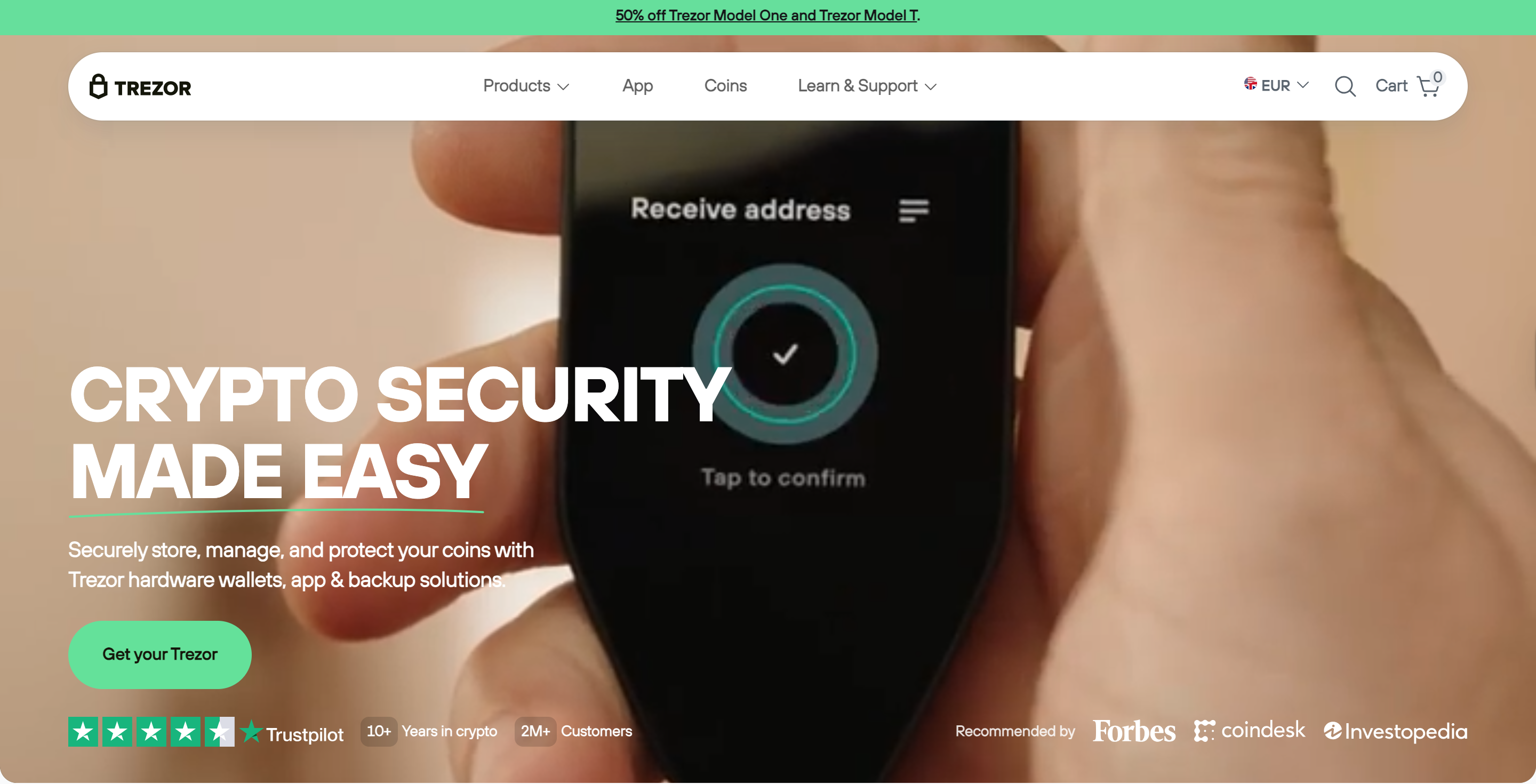
Technically, Trezor is an ecosystem of cryptographically protected devices: Trezor Model 1, Trezor Safe 3 and Trezor Safe 5, as well as a metal Backup Tool. As a special offer, Trezor wallets can be purchased in Bundles, i.e., toolkits for advanced self-custody experience.
Trezor Suite is a native application for operating assets secured by Trezor wallets. It enables users to buy, sell, swap, and stake cryptocurrencies — including Ethereum and Solana — directly within the app. As of August 2025, users have staked more than 200,000 ETH and over 683,000 SOL through Trezor Suite, without giving up control of their private keys.
Also, Trezor can be seamlessly integrated with a number of leading cryptocurrency applications, including MetaMask, BackPack, Rabby Wallet, Electrum, Ronin and dozens of other apps. The usage of third-party apps can be greenlit by entering a PIN.
To make the process of onboarding easier, Trezor offers its new clients to book an online session with Trezor experts, who guide the newcomers through all phases of wallet installation and authorization.
MetaMask
Website: https://metamask.io?from=article-links/?from=article-links?from=article-links
-
Launched in:Q1, 2016
-
Main business:Non-custodial cryptocurrency wallet for EVM blockchains
-
Blockchains:100+
-
Registration:USA
Backed by Ethereum (ETH) development studio ConsenSys, MetaMask is the most popular non-custodial cryptocurrency application in the world. It is designed to ensure secure, fast and cost-effective conversion between various classes of assets across EVM ecosystem blockchains.
Joseph Lubin
Native Swap
MetaMask Snaps add-ons
Besides being a secure and convenient non-custodial crypto wallet, MetaMask is a global gateway to the DeFi ecosystem as it can be seamlessly integrated with the vast majority of Ethereum-friendly dApps
MetaMask is a popular non-custodial crypto wallet and gateway to decentralized applications (dApps). MetaMask was launched in 2016 by Consensys, a blockchain software company of Ethereum co-founder Joseph Lubin. Originally a Google Chrome browser extension, MetaMask allows users to manage Ethereum-based assets, approve smart contracts and interact securely with the Web3 ecosystem directly from their browser or mobile device.
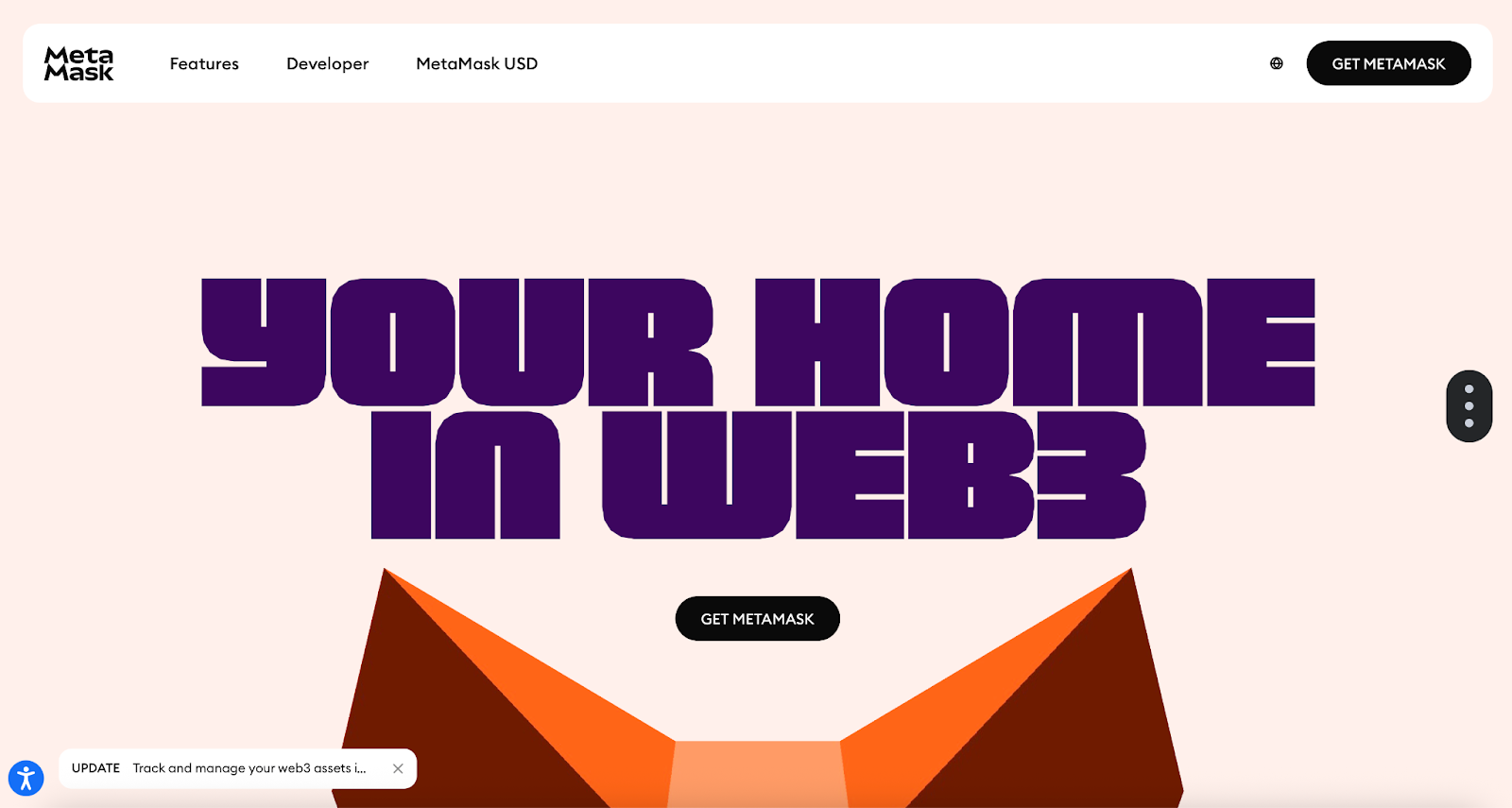
It operates on top of the Ethereum blockchain and supports other EVM-compatible networks such as BNB Smart Chain, Polygon, Avalanche, Arbitrum, Optimism and Base. MetaMask leverages Infura, a Consensys-backed infrastructure platform, for seamless blockchain access. Users can store, send and receive tokens, swap assets and explore DeFi, NFTs and DAOs in a 100% decentralized manner.
In 2023, MetaMask introduced MetaMask Snaps, a modular system that allows developers to extend wallet functionality. With Snaps, users can integrate non-EVM chains, including Bitcoin, custom notifications, privacy features and more, turning MetaMask into a fully customizable multi-chain wallet tailored to user needs.
CoinMarketCap
Website: https://coinmarketcap.com/?from=article-links?from=article-links?from=article-links
-
Launched in:Q1, 2013
-
Main business:Cryptocurrency data platform and price tracker
-
Blockchains:1,000+
-
Registration:USA
CoinMarketCap is a cryptocurrency price tracker and analytics platform. It demonstrates all crucial metrics for the global cryptocurrency ecosystem, including the likes of crypto prices, trading volume as well as major news, market sentiment statistics and the segment's performance.
Brandon Chez
No
Data platform, API integration, CoinMarketCap Learn module.
No
Despite being acquired by Binance, the world’s largest centralized cryptocurrency exchange, CoinMarketCap positions itself as an independent analytics tracker. It is the most popular website on crypto and blockchain in the world.
CoinMarketCap is one of the most widely used cryptocurrency trackers, offering real-time information on prices, market capitalization, trading volume and supply of tens of thousands of cryptocurrency assets. In the “Crypto Exchanges” section, CoinMarketCap demonstrates data on the exchange's activity, reserve sizes, deposits and so on.
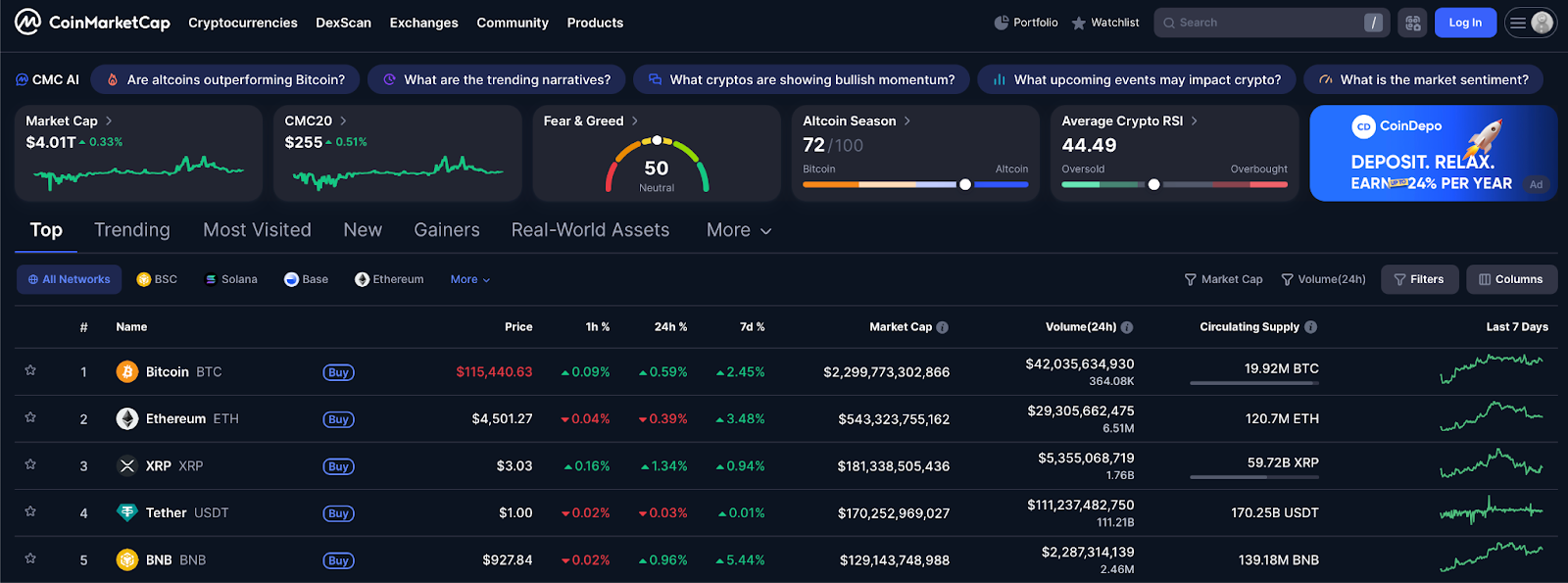
It was launched in May 2013 by Brandon Chez to provide transparent and reliable data for the growing crypto industry. Over time, it became the go-to resource for traders, investors and researchers tracking the global digital asset market.
The platform lists coins and tokens from hundreds of exchanges, ranking them by market cap, liquidity and trading activity. Users can view historical price charts, analyze market trends, track individual portfolio performance and set price alerts. CoinMarketCap also supports educational resources like glossaries and guides and features tools like converters and a mobile app for on-the-go access.
In recent years, CoinMarketCap has added features such as airdrops, token swap integrations, earn-to-learn programs and watch lists. After being acquired by Binance (see below), CoinMarketCap still positions itself as an independent resource.
Binance
Website: https://www.binance.com/?from=article-links?from=article-links
-
Launched in:Q2, 2017
-
Main business:Centralized crypto exchange (CEX)
-
Blockchains:100+
-
Registration:Cayman Islands/Hong Kong
Binance is the world's largest centralized cryptocurrency exchange by user count and aggregated trading volume. Binance delivers its services to tens of millions of traders in 170+ countries and regions across the globe.
Changpeng "CZ" Zhao, Yi He
Binance Wallet
Spot and futures trading, crypto-to-fiat gateway, NFT marketplace, staking, lending and earning instruments
BNB Smart Chain (BSC)
Listing on Binance is an endgame goal for the majority of modern altcoin products: It is normally associated with a huge price boost.
Binance is the world’s largest cryptocurrency exchange by trading volume and user count. Binance was launched in July 2017 by Changpeng Zhao, colloquially known as CZ. Originally based in China, Binance quickly grew due to its low trading fees, wide asset selection and a user-friendly platform. As of 2025, the company is led by Richard Teng, who became CEO after CZ stepped down in 2023.
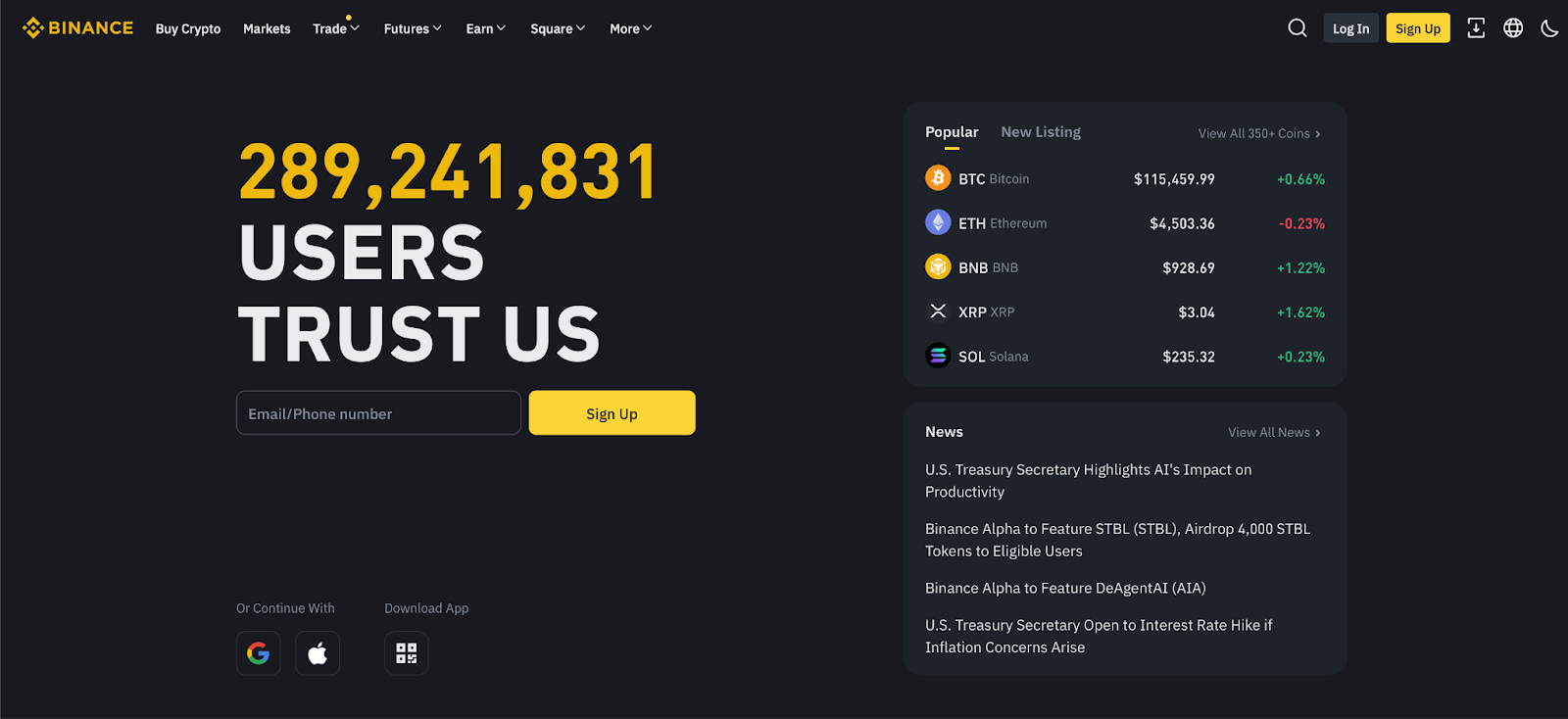
Binance offers a wide range of services beyond spot and futures trading, including Binance Wallet (Web3 wallet with early access to pre-listed coins), Binance Launchpad (a token launch platform for early-stage crypto projects), staking, savings and NFT trading. It supports over 1,600 spot trading pairs and over 300 futures contracts, making it a highly liquid and versatile platform for both beginners and advanced traders.
The native utility token, BNB (Binance Coin), is used for fee discounts, participation in Launchpad sales and DeFi services across the Binance ecosystem. BNB also powers BNB Smart Chain and BNB Chain, Binance-associated blockchains.
What is cryptocurrency?
Cryptocurrency (also crypto currency or crypto) is a digital form of money that exists within distributed ledgers — blockchains. Unlike traditional currencies issued by governments, cryptocurrencies are decentralized and operate with no centralized authority solely backed by decentralized computation power.
This design ensures transparency, immutability, cost-effectiveness and resistance to fraud. Bitcoin, first introduced in 2009 by pseudonymous developer Satoshi Nakamoto, was the first cryptocurrency and remains the most well-known and largest by market capitalization.
Users can send or receive crypto globally 24/7 with negligible transaction fees and faster processing times than banks. Cryptocurrencies can be used for purchases, investment, or spending in decentralized applications (dApps) in areas like finance, gaming and data storage within the Web3 ecosystem.
What are crypto apps?
Crypto apps are software applications that use blockchain technology and cryptocurrencies to offer decentralized services. They include wallets for storing digital assets, trading platforms, NFT marketplaces, DeFi tools, validation tools Move-to-Earn and Play-to-Earn games.
Simply put, if this or that application somehow utilizes cryptocurrency or requires its customers to do so, we consider it a cryptocurrency application.
Two main classes here include decentralized applications or dApps (core business logic is implemented via smart contracts, users are responsible for their private keys from crypto wallets) and centralized apps (include the centralized entity that stores private keys and user funds).
Crypto app categories: Top 5
Here is a brief review of the main categories of cryptocurrency applications you definitely heard about. These apps can be used for both profit generating and fun activities.
Cryptocurrency wallets
Cryptocurrency wallets are digital tools for basic financial operations with cryptocurrency. Instead of storing the crypto coins themselves, they store private keys, allowing users to send, receive and manage cryptocurrencies.
Crypto wallets give access to cryptocurrency coins and tokens on the blockchain. There are two main categories of cryptocurrency wallets: hot wallets (online, convenient) and cold wallets (offline, more secure), depending on the user’s security needs, tech background and strategy.
Crypto exchanges
Crypto exchanges are online platforms where users can buy, sell and trade cryptocurrencies. They act as marketplaces, offering tools for converting cryptocurrencies between each other or exchanging cryptocurrencies for fiat currencies like the U.S. dollar (USD) or euro (EUR).
There are centralized exchanges (CEXs) like Binance, which require registration, KYC checks and store users’ private keys, and decentralized exchanges (DEXs) like Uniswap, which allow peer-to-peer trading without intermediaries.
Decentralized finance protocols (DeFis)
Decentralized finance protocols (DeFis) are blockchain-based systems that offer financial services — like lending, borrowing, trading, or saving — without banks or intermediaries.
They run on smart contracts on programmable blockchains (Ethereum, Solana, Tron, BNB Smart Chain and so on) and are open to anyone with a non-custodial (decentralized) crypto wallet. DeFi platforms like Aave and Compound enable users to earn interest, trade assets, or take loans with no need to move money to centralized storages.
Crypto price trackers
Crypto price trackers are websites that display real-time prices, market data and trends for thousands of cryptocurrencies. They help users monitor price changes, trading volumes, market caps and portfolio performance.
Popular trackers also provide charts, sentiment heat maps, historical data, blockchain and AI news and exchange listings to support informed investment decisions and make trading and investing strategies more data-driven.
NFT marketplaces
NFT marketplaces are platforms where users can buy, sell, or trade non-fungible tokens — unique digital assets associated with pieces of content: art, music, or collectibles stored on blockchains.
These marketplaces connect creators and collectors. Transactions are done using cryptocurrencies, and ownership is secured via smart contracts, ensuring authenticity and traceability of each NFT. Also, some marketplaces offer the instruments for no-code creation of NFTs: Users just upload content and have tokens immediately listed on marketplaces.
Choosing secure crypto apps: Basic tips
These three rules can help cryptocurrency newcomers to make their first baby steps in the segment of crypto apps.
- Security first. Never share, expose, or send your private keys from wallets as well as passwords and other sensitive information.
- Single interface, many functions. Consider using a single application for many activities — it reduces attack surface and makes crypto operations more resource-effective.
- Never use what you don’t understand. Avoid get-rich-quick schemes, free distribution of rewards, suspicious lotteries and every activity that promotes easy online bonuses for everyone.
For every service, check out online reviews but always do your own research and never risk the money you can’t afford to lose 100%. Every investment in cryptocurrency remains risky.
Wrapping up: How to find your best crypto apps for daily use
Cryptocurrency app or cryptocurrency application is a software application for desktop, mobile or web interface that is using blockchains or asks customers to have a crypto wallet.
Best crypto apps in 2025 are secure, feature-rich and have clear UX/UI. Cryptocurrency wallets, price trackers, exchange and portfolio management apps are among necessary crypto apps for newcomers to the Web3 sphere. NFT marketplaces, DeFi apps, DAOs and crypto-to-fiat apps are also useful for all categories of users.
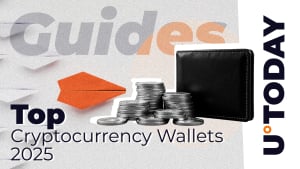

 Vladislav Sopov
Vladislav Sopov Dan Burgin
Dan Burgin